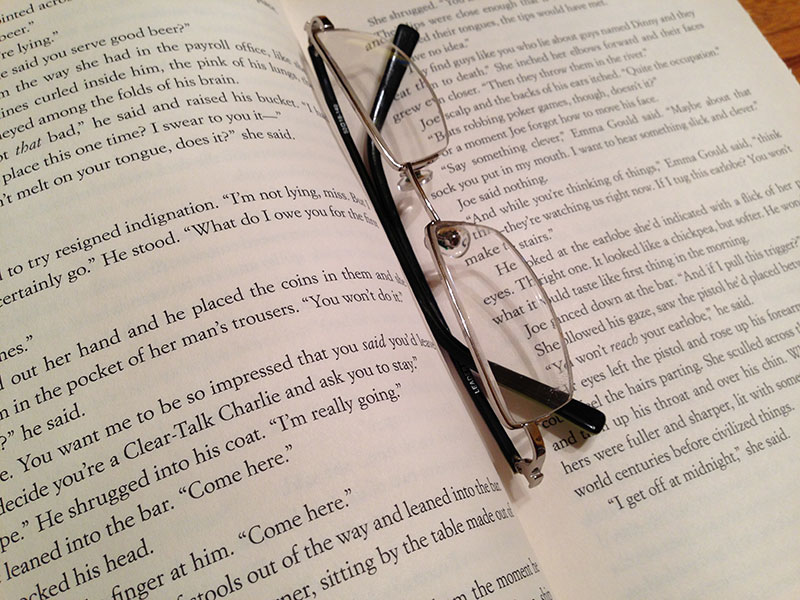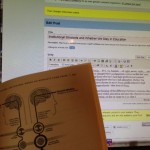After 65 days I could call my own, it’s back to the work. I spent a good portion of my time reading and hope to take much of what I learned forward into my professional duties.
School days are a mix of the routine and the unexpected. To the extent that I have solid habits in place to smooth my way through the routine, I have more brain available for the unpredictable. In The Power of Habit, Charles Duhigg, argues that habits are routines that link a cue to a reward. The game is not to change the cue or the reward, but to find a consistent routine that links the two. Finding “Keystone Habits” that enable small wins that accumulate and set in motion forces that favor success is critical. So is having a plan for “inflection points” – stressful events that make you want to quit. Duhigg stresses that the decisive factor in reaping the biggest rewards from Keystone Habits is belief in their efficacy.
Teaching involves a lot of persuasion. In To Sell Is Human: The Suprising Truth About Moving Others, Daniel Pink writes that selling is about convincing people to depart with resources in order to end up better off. He observes that in the past customers came to a vendor with problems to be solved. The modern paradigm is for vendors to help customers “uncover challenges they may not know they have.” He cites Jacob Getzels’ and Mihaly Csikszentmikalyi’s discoveries that students who find problems to solve end up with more creative solutions than students who work on a problem given to them.
Annette Simmons takes a different route to the same concepts. In The Story Factor: Inspiration, Influence, and Persuasion Through the Art of Story Telling, she offers this pearl: “People value their own conclusions more highly than yours. They will only have faith in a story that has become real for them personally.”
A lot of super teaching and learning will happen if I keep Pink’s and Simmons’ insights in mind.
My job involves making a lot of predictions – how well a new teaching method will help students learn, how persuasive a presentation will be to my colleagues, how long a task will take and what resources can best be expended to reach my ends. Nate Silver’s The Signal and the Noise, Why So Many Predictions Fail – But Some Don’t instructs readers to think of predictions as living things and that we should always make our best prediction now, regardless of what we predicted yesterday. He cautions that although we can control our decision-making process, real world randomness can foul the best protocols. Thus we should judge our process more than outcomes, because ironically, “being less focused on your results, you may achieve better ones.” Keeping Silver in mind should become a Keystone Habit whenever I do post-event reflections.
I’ll remember Incognito: The Secret Lives of the Brain by David Eagleman whenever I’m trying to understand that kid or assess any student’s understanding of that problem. Eagleman, a neuroscientist, writes that, “The condition of your brain is central to who you are” and relates that physicist Niels Bohr said that to understand the nature of the atom we need to change the definition of “understand.”
Fiction provides great professional development. In World War Z, by Max Brooks, an Israeli policy-making process is discussed. If twelve members of a committee are unanimous in an opinion, one of the twelve takes on the task of convincing the others they are wrong. I have no idea if the Israelis really do that, but what a weapon against presumption.
In Tropic of Night by Micheal Gruber, shamans with powers like mind control and invisibility are reeking havoc in Miami. One of Gruber’s characters explains that in the 90,000 years between human beings evolving to our present state and the rise of civilization after the invention of writing, our ancient forefathers mastered the “technology of the mind.” I’m not about to try mind control on my students or make myself invisible when the principal is near, but I will definitely try to uncover hidden depths in my own mind.
Finally, I’ve got to make time to read and bask in the beauty and possibilities of words written by a master, for no other reason than to nourish my senses, mind, and soul. Because you never know when you’ll come across a sentence like this in Dennis Lahane’s Live by Night: “When she found his eyes, hers were fuller and sharper, lit with something that had entered the world centuries before civilized things.”









